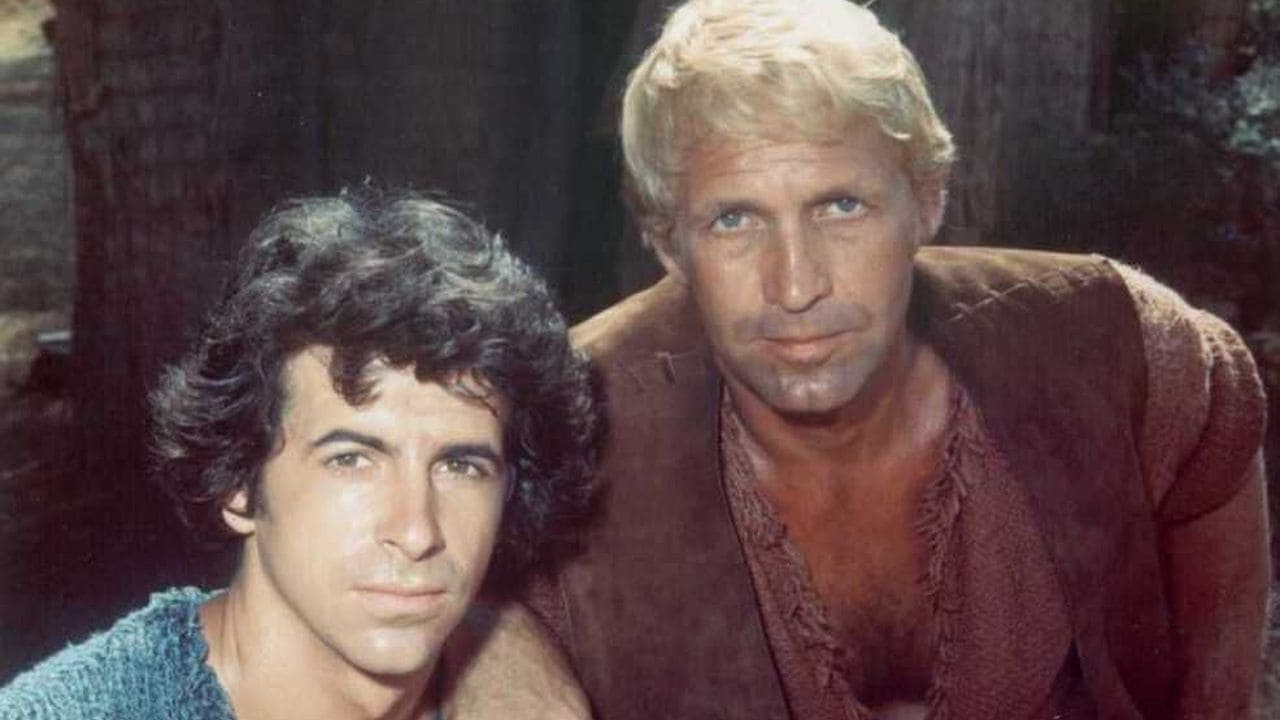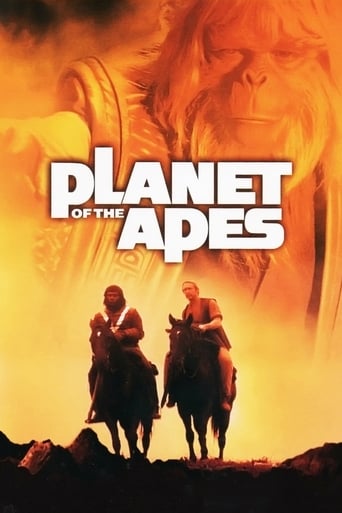Titreenp
SERIOUSLY. This is what the crap Hollywood still puts out?
Claysaba
Excellent, Without a doubt!!
Lucia Ayala
It's simply great fun, a winsome film and an occasionally over-the-top luxury fantasy that never flags.
alexanderdavies-99382
This TV series of "Planet of the Apes" wouldn't be quite the same without Roddy McDowall. After all, he is the one who is the common link regarding continuity of the original films.
The series was better than I expected. The first 4 episodes are very good and they get the proceedings off to a promising start.
Sadly, the remainder of the show includes episodes which are difficult to follow or that the plot is a bit mundane.
Naturally, the budget was bound to be fairly modest but the production staff did a good job with what they had. The sets for interiors are small but it's not a big problem.
It is a shame that only 14 episodes were made as the whole proceedings simply ceased in mid air. The late night time slot didn't exactly help the show's chances.
BaileySEA
I was twelve years old when PLANET OF THE APES premiered on CBS television. And being 1974 it was a decent production, and it had the same flavor as the films, which 3 of them had played out on CBS the season before. So, by this time I was an avid POTA fan, and was happy to see it as a weekly series. I was not disappointed at all. it was a good (maybe not great) series. Roddy McDowall appears as Galen (similar to the films Cornelius.) Too bad it didn't last on TV. I do remember thinking that it was unfortunate that Roddy McDowall didn't play Cornelius, and Kim Hunter would have been great in the series if she had re-prised her role of Zira. And I'm sure Maurice Evans would have made a better Dr. Zaius.
Bogmeister
The Apes saga spawned this short-lived TV series as the movies ran out of steam (following the 5th film in '73): this follows 2 astronauts (Harper & Naughton - a 3rd man died on impact) whose spaceship crashes on Earth of the future (a little over a thousand years from now, in year 3085): humans in this time period are 2nd-class citizens, ruled by apes (Orangutans, Gorillas, and Chimps). There is little or no technology, and the 2 visitors are on the run with new friend chimp Galen (McDowall) from the forces of orangutan politico Zaius (Colman) and General Urko (Lenard), a bad-tempered gorilla. Running around a wilderness area, their travails took on a 'running around in circles' tempo, since they never strayed far from their main nemesis. Much of the action involved the astronauts being chased by gorillas on horseback or fighting them with judo & karate moves. The heroes' ultimate fates were never revealed. Of interest to viewers from the Bay Area in California, since this is where the action took place (one episode, for example, took place in the ruins of Oakland - pretty good set design for a TV series).The logistics of the series makes sense in so far as it logically occurs about 900 years before the events of the first 2 Apes films: humans here have not yet devolved to unspeaking brutes, being merely a docile but still intelligent servant class. However, this does contradict the events of the final 3 films, which does point to those as the creation of an alternate timeline: most familiar with the saga point out the dog in the very 1st episode (dogs were wiped out between the 3rd and 4th films); also, the astronauts find a book showing an advanced New York City from year 2503, which means, in this version of the saga, Apes took over around the 27th or 28th century whereas, in the 5th film, mankind had fallen by our time (early 21st century). Big difference. There's also a brief mention, in the first episode, of other astronauts who'd bedeviled Zaius 10 years earlier, but we never learn anything about them, except that they'd been killed.The stories themselves were often parables, commenting on certain social strictures from our own history, involving a persecution of a lower class; one episode had allusions to the Ku Klux Klan activities of a century past, with apes in hoods. A better early episode was "The Trap," where Urko and one of the astronauts get trapped together in an old ruin by an earthquake; Urko soon learns of his true heritage and that these humans are much more resourceful than he dreamed. Indeed, the two astronauts usually showed an advanced proficiency in all areas compared to this ape culture, even in such endeavors as farming. McDowall played his 3rd chimp character here, similar to his Cornelius and Caesar, but a little on the wild side. Lenard, better known for his Sarek character in the Star Trek TV shows and movies, probably did the best work here as the violence-prone but intelligent gorilla military leader.
CelluloidTime
I have just returned from the Chiller Theatre Convention in NJ (April 25, 2004), where my children and I met in person with Ron Harper who played Alan Virdon in the "Planet of the Apes" television series. We encountered a genuinely "good guy", much like the noble character he played on the "Planet of the Apes" television series. The meeting made a favorable impression upon my children -- Mr. Harper's autograph is already framed and hanging on their wall.I enjoyed the "Planet of the Apes" television series as a child when it first aired in 1974, so I was intrigued to watch it again on DVD with my children. After watching the DVDs, I can report that I still enjoy the show. It is a shame that the series only ran for 14 episodes. Perhaps if Galen, Burke, and Virdon had been renewed for another season, the story lines would have broken-free from "The Fugitive"-type theme that dominated its (much too short) run? Even so, some of the episodes were of high quality, and, in my opinion, were actually as good as (if not better than) my two least favorite of the full-length "Planet of The Apes" motion pictures: "Escape from the Planet of the Apes" and "Battle for the Planet of the Apes". In particular, the episodes of the television series which took place within devastated city ruins standout in my mind as quite excellent television productions. I suggest that a single "Best of" DVD be released containing four of the better episodes for those fans who will find the $40 to $50 price tag for the Complete Series too steep.Some have questioned the logical inconsistencies in the television series. They note that some things that happen in the television series contradict things that happened in the films. One problem with their arguments -- with the introduction of time travel, the notion that history can be altered repeatedly by those who travel through time is introduced. Thus, the appearance of a dog in 3085 (the year depicted in the television series) does not contradict the claim made in "Conquest of the Planet of the Apes" that all cats and dogs were killed-off in the late-20th Century. Theoretically, a future time traveler might have traveled back in time and caused an event that saved dogs from annihilation. Also, it is conceivable that dogs were re-introduced into society somewhere between the late-20th Century and 3085, as scientific advancements in genetics made it possible. So, there is little merit to the argument that some events depicted in the television series don't jibe with events depicted in the films.
I feel that this television series very competently portrayed a believable ape-dominated world of the future. I recommend this box set, but with a caveat -- take your time getting through the 14 episodes, as the underlying "fugitive-on-the-run" theme can get monotonous if you watch all the episodes one-after-another.

